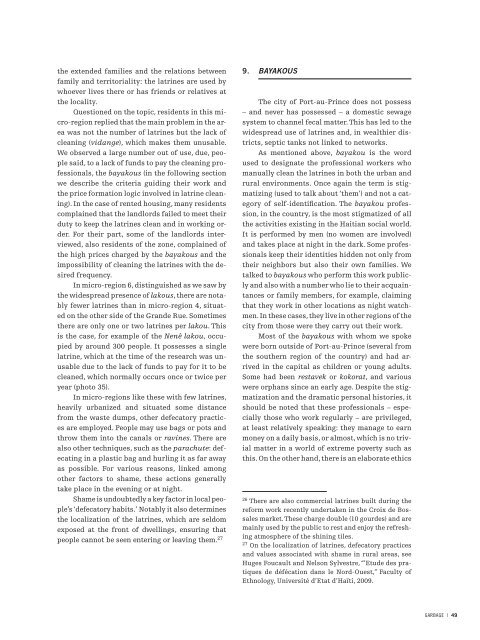déchets. stigmatisations, commerces, politiques ... - Viva Rio en Haiti
déchets. stigmatisations, commerces, politiques ... - Viva Rio en Haiti
déchets. stigmatisations, commerces, politiques ... - Viva Rio en Haiti
You also want an ePaper? Increase the reach of your titles
YUMPU automatically turns print PDFs into web optimized ePapers that Google loves.
the ext<strong>en</strong>ded families and the relations betwe<strong>en</strong><br />
family and territoriality: the latrines are used by<br />
whoever lives there or has fri<strong>en</strong>ds or relatives at<br />
the locality.<br />
Questioned on the topic, resid<strong>en</strong>ts in this micro-region<br />
replied that the main problem in the area<br />
was not the number of latrines but the lack of<br />
cleaning (vidange), which makes them unusable.<br />
We observed a large number out of use, due, people<br />
said, to a lack of funds to pay the cleaning professionals,<br />
the bayakous (in the following section<br />
we describe the criteria guiding their work and<br />
the price formation logic involved in latrine cleaning).<br />
In the case of r<strong>en</strong>ted housing, many resid<strong>en</strong>ts<br />
complained that the landlords failed to meet their<br />
duty to keep the latrines clean and in working order.<br />
For their part, some of the landlords interviewed,<br />
also resid<strong>en</strong>ts of the zone, complained of<br />
the high prices charged by the bayakous and the<br />
impossibility of cleaning the latrines with the desired<br />
frequ<strong>en</strong>cy.<br />
In micro-region 6, distinguished as we saw by<br />
the widespread pres<strong>en</strong>ce of lakous, there are notably<br />
fewer latrines than in micro-region 4, situated<br />
on the other side of the Grande Rue. Sometimes<br />
there are only one or two latrines per lakou. This<br />
is the case, for example of the N<strong>en</strong>ê lakou, occupied<br />
by around 300 people. It possesses a single<br />
latrine, which at the time of the research was unusable<br />
due to the lack of funds to pay for it to be<br />
cleaned, which normally occurs once or twice per<br />
year (photo 35).<br />
In micro-regions like these with few latrines,<br />
heavily urbanized and situated some distance<br />
from the waste dumps, other defecatory practices<br />
are employed. People may use bags or pots and<br />
throw them into the canals or ravines. There are<br />
also other techniques, such as the parachute: defecating<br />
in a plastic bag and hurling it as far away<br />
as possible. For various reasons, linked among<br />
other factors to shame, these actions g<strong>en</strong>erally<br />
take place in the ev<strong>en</strong>ing or at night.<br />
Shame is undoubtedly a key factor in local people’s<br />
‘defecatory habits.’ Notably it also determines<br />
the localization of the latrines, which are seldom<br />
exposed at the front of dwellings, <strong>en</strong>suring that<br />
people cannot be se<strong>en</strong> <strong>en</strong>tering or leaving them. 27<br />
9. BAYAKOUS<br />
The city of Port-au-Prince does not possess<br />
– and never has possessed – a domestic sewage<br />
system to channel fecal matter. This has led to the<br />
widespread use of latrines and, in wealthier districts,<br />
septic tanks not linked to networks.<br />
As m<strong>en</strong>tioned above, bayakou is the word<br />
used to designate the professional workers who<br />
manually clean the latrines in both the urban and<br />
rural <strong>en</strong>vironm<strong>en</strong>ts. Once again the term is stigmatizing<br />
(used to talk about ‘them’) and not a category<br />
of self-id<strong>en</strong>tifi cation. The bayakou profession,<br />
in the country, is the most stigmatized of all<br />
the activities existing in the <strong>Haiti</strong>an social world.<br />
It is performed by m<strong>en</strong> (no wom<strong>en</strong> are involved)<br />
and takes place at night in the dark. Some professionals<br />
keep their id<strong>en</strong>tities hidd<strong>en</strong> not only from<br />
their neighbors but also their own families. We<br />
talked to bayakous who perform this work publicly<br />
and also with a number who lie to their acquaintances<br />
or family members, for example, claiming<br />
that they work in other locations as night watchm<strong>en</strong>.<br />
In these cases, they live in other regions of the<br />
city from those were they carry out their work.<br />
Most of the bayakous with whom we spoke<br />
were born outside of Port-au-Prince (several from<br />
the southern region of the country) and had arrived<br />
in the capital as childr<strong>en</strong> or young adults.<br />
Some had be<strong>en</strong> restavek or kokorat, and various<br />
were orphans since an early age. Despite the stigmatization<br />
and the dramatic personal histories, it<br />
should be noted that these professionals – especially<br />
those who work regularly – are privileged,<br />
at least relatively speaking: they manage to earn<br />
money on a daily basis, or almost, which is no trivial<br />
matter in a world of extreme poverty such as<br />
this. On the other hand, there is an elaborate ethics<br />
26 There are also commercial latrines built during the<br />
reform work rec<strong>en</strong>tly undertak<strong>en</strong> in the Croix de Bossales<br />
market. These charge double (10 gourdes) and are<br />
mainly used by the public to rest and <strong>en</strong>joy the refreshing<br />
atmosphere of the shining tiles.<br />
27 On the localization of latrines, defecatory practices<br />
and values associated with shame in rural areas, see<br />
Huges Foucault and Nelson Sylvestre, “’Etude des pratiques<br />
de défécation dans le Nord-Ouest,” Faculty of<br />
Ethnology, Université d’Etat d’Haïti, 2009.<br />
GARBAGE | 49


